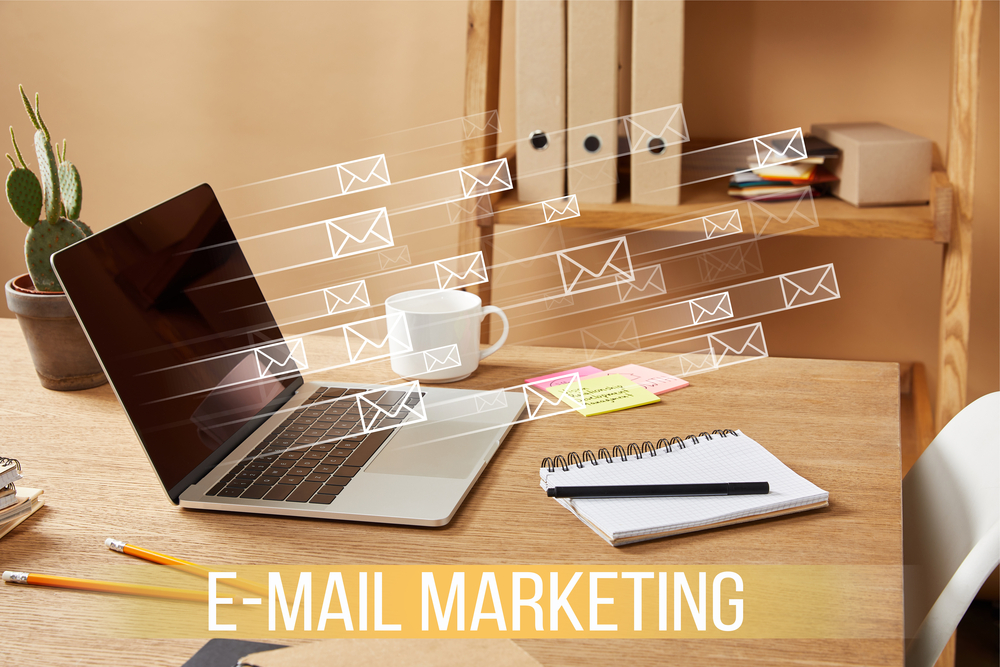Have you ever gotten an email that was tailored to you? Perhaps it was a customized recommendation based on your browsing history or an offer of a service or product you had just considered. It may surprise you to know that many of these emails are generated by AI (AI), and machine learning (ML) algorithms.
Email marketing has evolved in recent years from mass emails to a more targeted, personalized approach that uses data, analytics, and automation. AI and ML have been at the forefront of this evolution. They allow marketers to analyze large amounts of data, and create highly customized campaigns that are more efficient than ever. What is the exact role of AI and ML in email marketing? And how can they be used to improve results? Let’s explore the fascinating world that is AI and ML for email marketing.

AI and ML to Personalize Email Content
Personalizing email content involves creating messages that are relevant to each recipient. Content that is more tailored to the recipient will be more engaging and more likely to encourage them to take desired actions. It could be anything, from signing up for a mailing list to making a purchase.
It can be difficult for marketers to create personalized content for every single recipient. AI and machine learning (ML) can be used to create personalized content. AI and ML algorithms analyze data like past purchases, browsing behaviors, and demographics to create highly personalized and targeted content that speaks directly to each individual’s unique needs and interests.
If a recipient previously expressed interest in a specific product category, an AI-powered email marketing platform could automatically fill the email with products, offers, or recommendations relevant to that recipient. If a recipient is not engaging with emails for a long time, an AI-powered email marketing platform can send them a personalized re-engagement email that includes a special deal to encourage them to act.
Marketers can personalize email content using AI and ML to increase relevance and effectiveness, leading ultimately to more conversions.
Optimizing email send times with predictive analytics
Email marketing is all about timing. When you send an email at the perfect time, it increases the likelihood that the recipient will open and interact with the message. It can be difficult for marketers to determine the best time to send emails. Predictive analytics can help.
Predictive Analytics is a technique that uses historical data to determine the likelihood of future outcomes. It can be used in email marketing to determine when to send an email.
Predictive analytics can identify patterns in recipient behavior by analyzing factors like open rates, click-through rates, and convert rates. The information obtained can be used to determine when the best time to send emails to each recipient. If a recipient opens their emails at night, for example, the platform will automatically schedule emails to be sent in the future.
Optimizing the send time of emails with predictive analytics will result in higher open and engagement rates. This, in turn, can result in increased conversions and revenue. It can also save marketers time by automating the process to determine the best time to send emails to each recipient. This allows them more time to concentrate on other aspects of email marketing.
Machine learning for automated email campaigns
Marketing professionals can find it difficult to manage and create email campaigns. Automated email campaigns using machine learning are a great way to help. Email marketing platforms that use machine learning algorithms can send highly personalized and targeted email campaigns to specific segments without the need for manual intervention by marketers.
In most cases, the process of automating email campaigns using machine learning begins with the marketer selecting the trigger for the campaign. This trigger can be an action that the recipient takes, like making a purchase. The machine learning algorithms will then automatically generate and send a highly-targeted email once the trigger has been activated.
If a customer purchases a product, the platform could automatically launch a post-purchase campaign with customized recommendations that are based on past purchase histories. If a prospect subscribes to a newsletter, for example, the platform could automatically send a series of welcome emails that introduce the brand and encourage them to take additional actions.
Machine learning-based automated email campaigns can save time and effort for marketers while improving the effectiveness of campaigns. These campaigns increase engagement by using data to send highly targeted and relevant emails. This will ultimately lead to more revenue and conversions for the marketer.

AI Enhances Email Delivery
Email deliverability is the ability for an email to be delivered to the recipient’s Inbox, without being marked as Spam or bounced. Deliverability is crucial for email marketing campaigns. AI can help.
AI-powered email platforms can analyze various factors such as content and sender reputation to determine email delivery. The platform, for example, can scan an email’s content and flag words or phrases commonly associated with spam. It can also monitor a sender’s reputation for email and take action to improve it. For example, reducing the number of emails sent out to non-engaged recipients.
AI can also be used to analyze recipient engagement data such as click-through and open rates to identify patterns or trends. The information can be used to improve the deliverability of emails by adjusting email content, timing, and targeting.
AI-enhanced email deliverability can result in improved click-through and open rates. This will lead to more revenue and conversions for the marketer. It can also help protect the sender’s reputation and prevent being flagged for spam, which could hurt future campaigns.
AI-driven segmentation helps you target the right audience
Targeting the right audience for email marketing is essential to success. If you send an email to the incorrect audience, it can lead to low engagement, high unsubscribes, and even damage the reputation of the marketer. AI-driven segmentation can help.
AI-powered email platforms can analyze data such as demographics and past purchase behavior to create highly segmented and targeted email lists. The marketer can then send the correct message to the appropriate audience to increase the likelihood of conversion and engagement.
As an example, a clothing e-commerce site may use AI segmentation to create separate email lists for those customers who previously bought women’s clothes and men’s clothes. They can then send emails that are highly targeted with offers and products that will appeal to each individual.
AI-driven segmentation leads to increased engagement, conversions, and revenue for marketers. Targeting the right audience and sending the right message can help marketers create a personalized experience for customers, increasing their satisfaction with their brand.
Analysis of Email Engagement Data using ML
Email marketing is not complete without analyzing email engagement data. Understanding how recipients interact with email campaigns allows marketers to make data-driven choices that optimize their strategy. Here, machine learning (ML), can be an invaluable tool.
Email marketing platforms using ML algorithms can analyze engagement data, such as click-through rates and conversion rates, to identify patterns and trends. The platform could, for example, use ML to segment users based on engagement levels, such as highly, moderately, or disengaged.
Marketers can better target their emails using segmentation. The platform can suggest exclusive offers or early access to products for highly engaged recipients. For disengaged recipients, the platform suggests re-engagement campaigns with incentives that encourage them to engage again.
The platform can also analyze emails to determine which elements are likely to generate engagement. The platform, for example, may determine that certain subject lines and calls-to-action lead to higher click-through or open rates.
Analyzing data on email engagement can allow marketers to make informed decisions about how to improve their email campaigns. Machine learning can help marketers better understand their audience by identifying patterns and trends. They can then optimize their campaigns to increase conversion rates, engagement rates, and revenue.
Improve conversion rates with AI-powered A/B testing
A/B testing, also known as split testing, is a practice that is common in email marketing. It involves sending out two versions of the same email to different segments to see which performs best. Marketers can optimize their campaigns to improve conversion rates. Manually conducting A/B testing can be time-consuming, and relies more on intuition than data. AI-powered A/B tests can help.
AI-powered email platforms can analyze data such as click-through, open, and conversion rates to determine the most effective variations for an email campaign. The platform could, for example, use AI to test various subject lines, images, or calls-to-action, as well as sender names, to determine the ones that lead to the most engagement.
AI-powered A/B tests can save time for marketers and improve their accuracy. The platform uses machine learning to identify the most effective variation, and then automatically adjusts the campaign so that the winning version is sent to the rest of the audience. This allows marketers to optimize campaigns in real-time and increase conversion rates.
Marketers can increase their revenue by improving conversion rates through AI-powered A/B tests. Marketers can increase engagement by identifying the most successful elements in an email campaign. This can lead to increased conversions and sales.

Use chatbots and virtual assistants for Email Marketing
Chatbots, virtual assistants, and other automated systems are increasingly used in customer support and service. They can also be utilized to improve email marketing campaigns. Marketers can offer a more interactive and personalized experience to their customers by integrating virtual assistants and chatbots into their email strategy.
Automated customer service via email is one way to use chatbots or virtual assistants for email marketing. Chatbots are programmable to provide personalized customer support and answer frequently asked questions to customers responding to email campaigns. A chatbot, for example, can assist customers in tracking their orders, solving common problems, or offering personalized product recommendations.
Chatbots and virtual assistants can be used to create interactive customer experiences. A virtual assistant can be used, for example, to guide customers through product demonstrations or create a personalized shopping environment. This can increase engagement and create a stronger relationship between the brand and the customer.
Chatbots and virtual assistants can be used in email marketing to automate some tasks such as A/B testing or list segmentation. It can save time for marketers and increase the effectiveness of their emails.
Integrating chatbots or virtual assistants with email marketing can improve the customer experience and increase engagement. This will ultimately lead to increased conversions and revenue. Marketers can improve their email campaigns by providing personalized support to their customers and creating interactive experiences.
Email Marketing in the Future with AI and ML
AI and machine learning (ML) are increasingly shaping the future of email marketing. These technologies are expected to continue to improve the efficiency and effectiveness of email campaigns as they advance.
Personalization is one area where AI and ML will likely have a significant impact. Email marketing platforms can personalize email content by leveraging data sources such as social media, browsing history, and purchase history. This can result in higher engagement rates, more conversions, and increased customer loyalty.
Automation is another area where AI and ML will have a major impact. AI and ML will become more sophisticated and be able to automate more tasks. This includes list segmentation, A/B tests, and content creation. The result will be that marketers can focus on strategy and creative development while AI and ML handle mundane tasks.
AI and ML also enable marketers to make better decisions and analyze data with greater accuracy. Email marketing platforms can provide more insights into recipient behavior and campaign results by leveraging machine learning and advanced analytics algorithms. Marketers will be able to optimize campaigns and get better results.
Email marketing campaigns will become more personal, automated, and data-driven in the future thanks to the evolution of AI and ML. These technologies will allow marketers to increase the effectiveness of campaigns, improve engagement rates and drive more revenue.

AI and Machine Learning in Email Marketing: Challenges and Considerations
Marketers should be aware of a few challenges and considerations when using AI and Machine Learning (ML).
Data privacy and security are two of the most important challenges. As AI and ML are increasingly used, concerns about how personal data will be collected, stored, and used have grown. Marketers must ensure they comply with data protection laws and use data responsibly and ethically.
A shortage of skilled personnel is another challenge. The implementation of AI and ML requires specialized expertise and knowledge. The companies need to hire and train professionals with the skills to use these technologies, and who can assist in developing and implementing effective email marketing strategies.
A significant amount of data is also required to use AI and ML for email marketing. Marketers need large quantities of high-quality information to train and improve algorithms. Data collection, management, and analysis are therefore key marketing priorities.
AI and ML are used ethically. These technologies can be used both to enhance the effectiveness and efficiency of email campaigns as well as to deceive or manipulate customers. Marketers must ensure that AI and ML are used ethically and transparently to benefit the customer.
Marketers should also consider the costs of implementing AI or ML. These technologies are not only beneficial, but they can be costly to maintain and implement. These technologies can be expensive to implement and maintain, so companies need to carefully weigh the benefits and costs of using them and decide if the investment is worth it.
AI and machine learning in email marketing can be great tool, but it also presents challenges. Before implementing these technologies, marketers should carefully consider ethical implications, data security and privacy, personnel requirements, and data collection. This will allow them to ensure that AI and ML are used in a way that is both responsible and beneficial for the customer as well as the company.
Final Thoughts
AI and machine learning (ML) have transformed the world of Email Marketing. These technologies allow marketers to personalize content, automate campaigns and enhance deliverability. They can also target the right audience.
Chatbots and virtual assistance can also improve customer satisfaction and engagement. There are many challenges to consider when implementing this technology, including data privacy and security. Other considerations include personnel requirements, data management and collection, ethical implications, and cost implications. Despite these challenges, the evolution of AI and ML will continue to shape the future of email marketing, making campaigns more personal, automated, data-driven, and personalized.